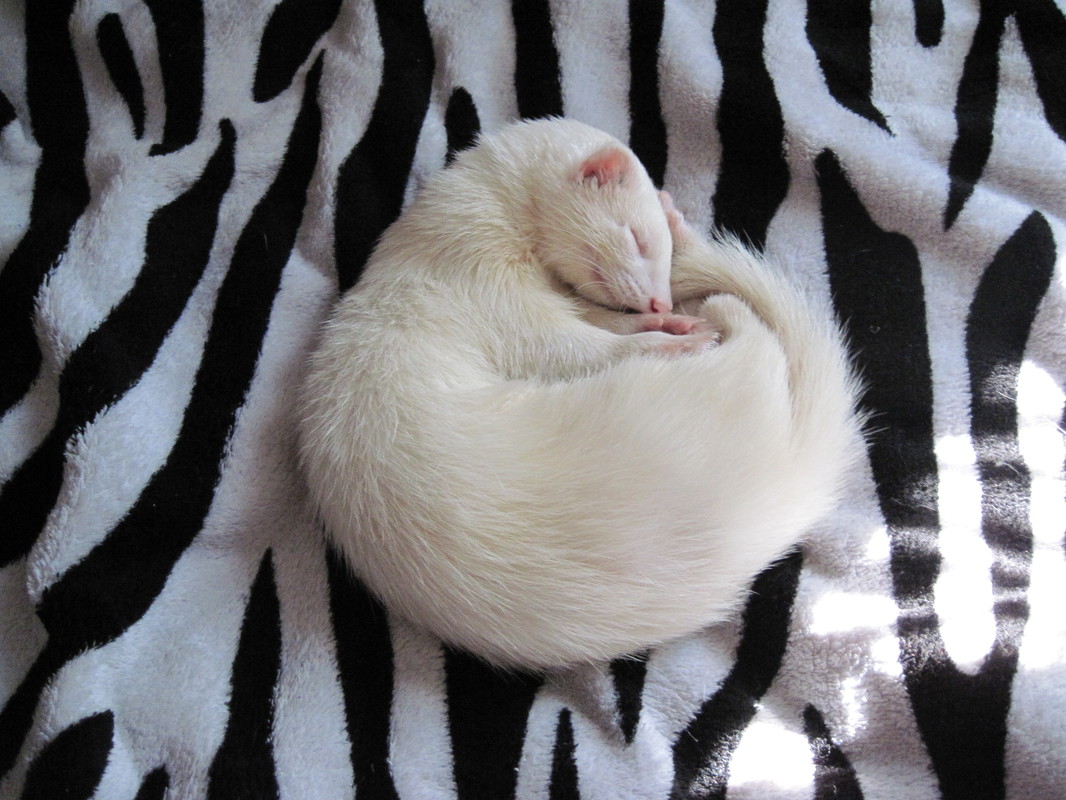|
People often ask us “do ferrets make good pets?” Like most subjective questions, the simplest answer is “well, it depends.” Ferrets can be great pets for people who value a small, quiet, and interactive pet. However, ferrets are not great for those who want a low cost pet that doesn’t require much time or energy. Unlike many of the animals that we present in shows, ferrets are actually domesticated. As dogs are to wolves, ferrets are to their wild counterpart, European polecats. They have been domesticated for roughly 2,500 years. They were originally used to hunt rabbits and other small rodents. Their domestication process is more similar to dogs than to cats in that they were bred for their ability to cooperate with humans while hunting (Domesticated: Evolution in a Man-made World by Richard C. Francis). By nature, ferrets are more social than cats, but less social than dogs. Their body language tends to be more expressive than that of a cat, but they are still considerably more aloof than a dog. Individual ferrets have a range of personalities and temperaments. Here, at Ferrets and Friends, we have a five year old male, Samson, who will frequently request to be held, get his back scratched, and his belly rubbed. Our four year old female, Ramona, will show curiosity about human activity, but she mostly prefers to seek out her own adventures which include hiding toys. Our newest addition, Riley, is about four months old and full of energy. She spends most of her time chasing after people, jumping and tackling their legs or feet, and playing with whoever finds her antics amusing. The level to which a ferret wants to engage with people varies greatly with each individual. Even though ferrets are domesticated, an untrained ferret can be a bit too “wild”. Ferret skin is actually tougher than people skin, so young ferrets must be taught what level of biting is acceptable for their human friends. Ferrets naturally play very rough! Most kits can be taught to be gentle and to not nip faces, ears, or ankles. An adult ferret who was never taught good manners with people can be trained, but it may take more work as this behavior has likely been unintentionally reinforced throughout its life. The Challenges of Ferret Ownership Can ferrets be housebroken or litter-trained? Most ferrets can be trained to a certain extent. As they naturally prefer to go to the bathroom in corners, placing a litter pan in the corner may be sufficient for some ferrets to learn the desired behavior. Other ferrets will be very stubborn, even “faking it” when their owners place them in the litterbox so they can go eliminate where they originally wanted. Ferrets have a very fast metabolism and need to eat every 4-6 hours, which means they will eliminate just as frequently. That’s a lot of mess for a small animal! As a carnivorous mammal, their excrement is closer to a cat’s or dog’s, which means that it cannot easily be swept up as is the case with rodents such as rabbits, chinchillas, or guinea pigs. While many stores will advertise ferrets as being a “caged” pet, cages do not allow ferrets adequate stimulation or exercise. Here, at Ferrets and Friends, our ferrets have their own room and are also allowed supervised play outside of their room for a few hours per day. If ferrets are kept in a cage, they should have at least four hours per day of out of cage time (preferably broken into two separate sessions). Providing ferrets with a safe play area can be one of the most difficult parts of ferret ownership as ferrets are able to get into EVERYTHING. Anywhere their skull can fit, their squirmy bodies can follow. This can mean under cabinets, inside furniture or appliances, under doors, into walls, and anywhere you could imagine. There are few commercial pet gates or baby gates that ferrets can’t either fit through or climb over. Some ferrets are known to chew cords or scratch carpet. Their intelligence can become a hazard as they learn to pull open sliding doors or unzip purses and bookbags. Ferret-proofing an area is an act of constant vigilance and creativity. The larger the area in your home that your ferrets have access to, the more you’ll have to factor in your ferrets’ penchant towards mischief in your decisions about furniture and furniture placement. In this way, ferret ownership can become a lifestyle. The cost of ferret ownership will be similar to that of a dog or cat. They require annual vet visits and vaccines for rabies and distemper. There are also several diseases that are common as ferrets get older which will require costly treatments. With their unending curiosity, even in a ferret-proofed home there is still a risk for an emergency vet visit. A vet bill of $500-$1500 is not unheard of for pet ferrets and is likely to occur at some point in your ferret’s lifetime. If you haven’t been dissuaded by these factors, chances are that you may be the kind of person who would enjoy sharing your life with a ferret. While their ability to create messes is outstanding, ferrets are generally very clean. Regular nail trimming is usually necessary about once per month and a bath may only be necessary every few months. Bathing your ferret too frequently can actually increase their smell as their bodies produce more oil to compensate. Ferrets only shed twice per year as they change their seasonal coats. Allergies to ferrets are very rare and are usually unrelated to a person’s allergies to cats or dogs.
Owning a ferret can be compared to having a puppy or kitten that doesn’t grow up. They tend to sleep most of the day, but when they are awake it’s time to play! Sometimes that play can involve digging up houseplants or stealing items from the laundry hamper. If you have a good sense of humor and you’re looking for a small pet to bring some excitement into your life, ferrets may be for you! Just be sure to put some money aside and stock up your cleaning supplies.
0 Comments
|
About the blogFerrets and Friends, LLC has four writers bringing you information on a variety of topics from pets to wildlife, education to conservation, and from new developments in our business to information about our industry. Learn something new each week! Archives
August 2020
Categories
All
|


 RSS Feed
RSS Feed